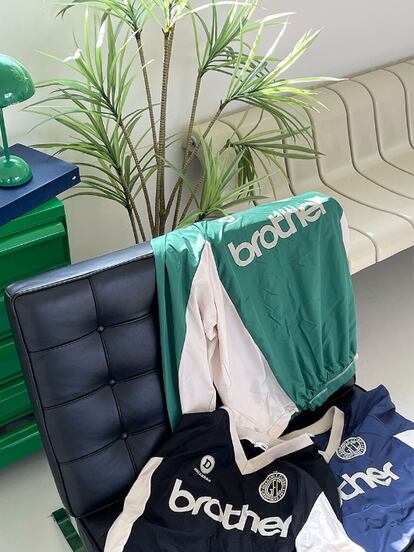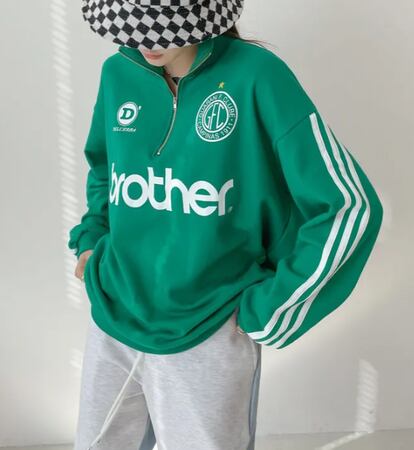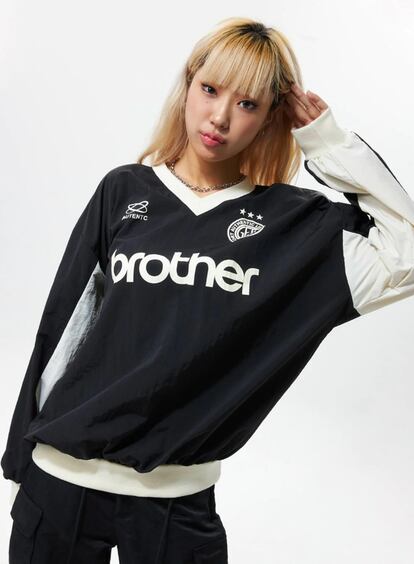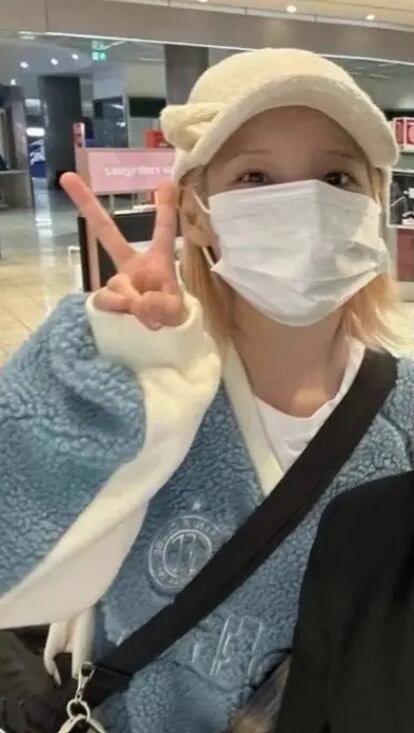It is not common to see a Guarani fan on the streets of Brazil. The soccer team from Campinas, the third largest city in the state of São Paulo, is proud to have been the only club from the interior to win the Brazilian championship, but it has been a long time since it competed on equal terms with the big names of that sport. Finding a fan of his outside of his hometown is almost a rarity. But even more curious is knowing which audience has fallen in love with their green uniform: young fans of J-Pop and K-Pop (Japanese and Korean pop) from the other side of the world.
It all started with a post on Instagram. In a photo shared in October last year, Japanese artist Rio Hanabashi posed in front of the more than 1.6 million followers of her girl band, NiziU, from the locker room seats of a sports facility. Over her khaki cargo pants she wore Guarani's green shirt. Following in her footsteps, the Korean Gaeul, from the group IVE, made her appearance with a pink version adorned with silver details. South Korean singer IU, for her part, appeared in a blue wool version while she left a hotel in Milan. Both were bootleg t-shirts from unknown designers.
It was enough to turn the garment into an object of desire among her millions of followers. The shirt of a team outside the first division for more than a decade has taken on a new life thanks to the fans of these singers and is now available in various digital stores in South Korea. For a price that reaches up to 50 euros The set, which is originally green, can be purchased in a variety of versions: made of different materials, with modifications to its shield and even with alternative colors (which includes the black and white of its biggest rival, the Ponte Preta). However, it is still unequivocally the Guarani uniform: the letters GFC on the left, the old sports equipment brand Dell'Erba on the right and, usually, the sponsor, which is usually the multinational Brother, on the abdomen.
The use of soccer jerseys is not something new in the world of fashion. He blockcorea term coined by TikTok user Brandon Huntly in December 2021, describes a style that fuses traditional uniforms with other clothing items, evoking the way uncles (blokes, in English) used to dress up to support their teams during games. The team t-shirt is essential, usually accompanied by jeans and sneakers. The emergence of blockcore has contributed to further disseminating the emblems of the great clubs around the world.
K-Pop, for its part, has imposed its influence on fashion since its inception. As their singers choose their style, their followers are quick to emulate them. In 2015, the leggings Adidas sneakers were sold out in South Korea after singer Son Naeun, from the group Apink, wore them. Some brand stores promoted them as “Naeun's pants.” Similarly, the singer Yuna unleashed the obsession with a black Zara bag. In men's fashion, the crop top gained popularity thanks to singers such as Jungkook of BTS, Kai of EXO, and Yeonjun of TXT.



But how did the Guarani shirt reach the K-Pop orbit? The main theory is that the clothes remained in Japan after a tour that the team made to that country in 1996. On that occasion the Brazilians played two friendlies against Verdy Kawasaki and Kashima Antlers. Striker Adriano Raio, who was part of the trip, remembered in the Brazilian sports media Esporte Balloon that it was common to exchange clothes: “It happened during the change of sponsor. They gave us t-shirts for the trip, both the old kits and the updated ones with the new sponsorship. We used to exchange the new ones wit
h our rivals after the games and we gave the old ones to those fans who took photos with us.” It is very likely that some have passed from hand to hand until they reached Rio Hanabashi's closet.
In the profiles of X (formerly Twitter) in Brazil, it is common to find pages that fuse elements of Asian culture, such as anime or K-Pop, with news about soccer teams. Pages like @animefla (dedicated to Flamengo) and @kpopspfc (dedicated to the São Paulo Fútbol Club) have thousands of followers who interact with memes and montages that combine their idols [como se denomina a las estrellas surcoreanas] with the uniforms of their favorite teams.
Oziel Moura, a Guarani fan and K-Pop fan, found the idea of creating a similar page natural after the image of Rio wearing his team's shirt went viral: “It was an opportunity to combine music with sport and make K-Pop known to fans, as well as Guarani to K-Pop fans,” he says. Moura was excited when she saw the singer and her beloved t-shirt together for the first time: “There was a lot of doubt and euphoria among the fans; “No one understood what was happening, but we were happy to see something we love with or with such influential people on the other side of the world,” he says.
Curiosity about the use of t-shirts turned his page, @guarani_kpop, the reference point for all the news about other singers who wear it and theories about the arrival of uniforms in Asia. “We started research to find out the origin of the t-shirts and always updated when something new came up,” she explains. Furthermore, this phenomenon gave him the opportunity to immerse himself even further in K-Pop culture: “Gaeul, from the group IVE, and IU are already established artists in the country, we already knew them, but Rio was a new artist.”


The Guarani has not yet obtained benefits from the new trend. The team has not licensed its brand to any company in Korea, so the garments are sold irregularly. While they try to develop an official sales channel with local companies, the club enjoys its newfound celebrity, even if it is not for sporting reasons. Adriano Hintze, director of marketing of the organization, was surprised by the viralization: “We realized that there was a very big impact on the networks and we immediately took the opportunity to republish it,” he tells ICON. Furthermore, the bugre, as the team is also known, took the opportunity to announce an official collection inspired by K-Pop and the uniform worn by the artists. “We are going to offer it in different colors, but we automatically exclude the black color due to the rivalry with Ponte Preta,” says Hintze.
The club is trying to prepare meetings with the artists. Gaeul, who wore the pink version, has a concert scheduled for June in São Paulo. “We plan to give away the official uniforms not only to Gaeul, but also to Rio and other idols who wore the shirt. We want something exclusive for their concerts,” adds Hintze.
Although the meeting is not yet guaranteed, the team's mark on Asian fashion has already been marked. Amid a sea of giant teams competing for ever-increasing exposure for their brands, the team's jersey bugre It stands out not for a million-dollar budget, but for its simplicity retro of its design. While the club concentrates on its training before the start of the Brazilian season, it welcomes a new fan who, although far from the fields where it plays, honors the first verses of its anthem: “I always carry with me /to any location/the green and white flag/symbol of the fans.”
You can follow ICON on Facebook, x, instagramor subscribe here to the Newsletter.
#jersey #division #team #Brazil #favorite #object #Korean #pop